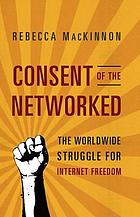
Consent of the networked : the worldwide struggle for Internet freedom
By - MacKinnon, Rebecca
Floor
-
Floor 1
Published
-
Basic Books, New York, ©2012
ISBN 13 - 97804665063758
Book Status
-
1 Qnty Available with us.
Subject
-
Internet--Social aspects
Shelf No
-
13
common.call_no
-
302.231 MAC
common.physical_description
-
xxv, 294 pages ; 25 cm
Notes
-
Includes index
Google has a history of censoring at the behest of Communist China. Research in Motion happily opens up the BlackBerry to such stalwarts of liberty as Saudi Arabia. Yahoo has betrayed the email accounts of dissidents to the PRC. Facebook's obsession with personal transparency has revealed the identities of protestors to governments. For all the overheated rhetoric of liberty and cyber-utopia, it is clear that the corporations that rule cyberspace are making decisions that show little or no concern for their impact on political freedom. In Consent of the Networked, internet policy specialist Rebecca MacKinnon argues that it's time for us to demand that our rights and freedoms are respected and protected before they're sold, legislated, programmed, and engineered away. The challenge is that building accountability into the fabric of cyberspace demands radical thinking in a completely new dimension. The corporations that build and operate the technologies that create and shape our digital world are fundamentally different from the Chevrons, Nikes, and Nabiscos whose behavior and standards can be regulated quite effectively by laws, courts, and bureaucracies answerable to voters. The public revolt against the sovereigns of cyberspace will be useless if it focuses downstream at the point of law and regulation, long after the software code has already been written, shipped, and embedded itself into the lives of millions of people. The revolution must be focused upstream at the source of the problem. Political innovation - the negotiated relationship between people with power and people whose interests and rights are affected by that power - needs to center around the point of technological conception, experimentation, and early implementation. The purpose of technology - and of the corporations that make it - is to serve humanity, not the other way around. It's time to wake up and act before the reversal becomes permanent. -- From publisher description